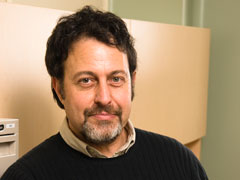A Broadening of Direction
By Jim Oldfield
Sunnybrook Research Institute (SRI) has established a new research discipline—combined health services sciences (CHSS)—and appointed Dr. Merrick Zwarenstein its inaugural director. The CHSS discipline harmonizes with SRI’s four existing disciplines, molecular and cellular biology, imaging, clinical integrative biology and clinical epidemiology. It will be dedicated to furthering SRI’s vision of inventing the future of health care via an explicit health services sciences framework, by providing stable funding and administrative support and hiring new faculty and research staff.
“The CHSS discipline will round out Sunnybrook’s offerings in science, complementing expertise in basic and clinical research with the deep knowledge of how these are integrated into health care delivery systems,” says Zwarenstein. A senior scientist at SRI and the inaugural chair of Sunnybrook’s year-old Centre for Health Services Sciences, Zwarenstein will focus his research and administrative activities—previously spread among four Toronto institutions—exclusively at Sunnybrook.
“We are thrilled to welcome Merrick into the fold as director of this new and vital research discipline,” says Dr. Michael Julius, Sunnybrook’s vice-president of research, who made the appointment in June. “As an investigator with a tremendous breadth of knowledge in health services sciences, Merrick’s stewardship will extend Sunnybrook’s role as a global leader in the delivery of safe, quality health care.”
Having studied health services sciences in Johannesburg, South Africa; then London, England; and Stockholm, Sweden, Zwarenstein came to Canada five years ago with a well-developed sensitivity to what he calls the “social complexity” of health services research. “The field has wide ambitions that require working with communities and facilities delivering health care outside research labs or computer terminals,” says Zwarenstein. But it’s wrong, he cautions, to think of that complexity as a barrier. “It comes with the terrain—it is the terrain,” he says. “It’s the thing that intrigues people who go into this discipline.”
First understanding, then acting on, the complexities of social interaction and the vagaries of human nature in the context of patient safety and care is a daunting challenge indeed. But it was the success of the Centre for Health Services Sciences in this very endeavour over the last year that prompted SRI’s creation of the CHSS discipline. The centre helped pull together the hospital’s existing capacities through four platforms: hospital epidemiology, knowledge translation, the clinical studies resource centre and patient safety improvement research. In so doing, says Zwarenstein, it connected hospital managers and leaders with frontline clinicians from all professions and researchers across the hospital, all focusing on quality improvement and safety.
While the connections between stakeholders built by the centre are crucial for Sunnybrook’s implementation of existing health service delivery knowledge, the CHSS discipline is where new science and researchers will be nurtured. The discipline, Zwarenstein says, will become a network of research colleagues and a source of information, both practical (e.g., how to get research done at Sunnybrook, where to find support and resources) and scientific. “Without a growing body of world-class scientific research on health service delivery, the Centre for Health Services Sciences will be merely recycling the knowledge grown by others elsewhere. We need to contribute to the garden, not merely eat from it," says Zwarenstein. "I'm delighted to be here,” he adds, “because I think Sunnybrook is taking a uniquely forward-looking approach to health research, and sees that health services sciences is a positive part of that."








